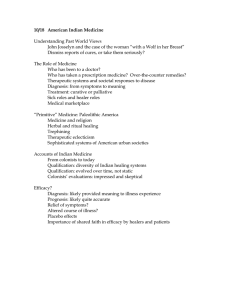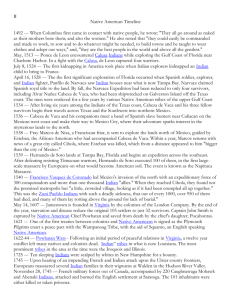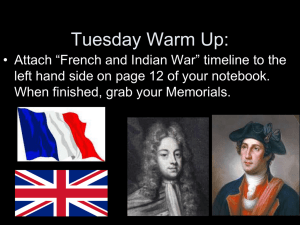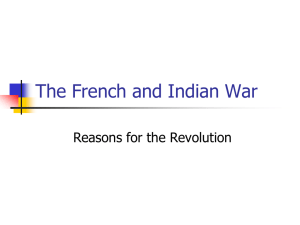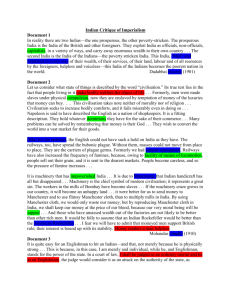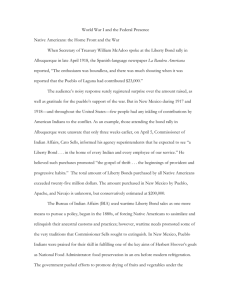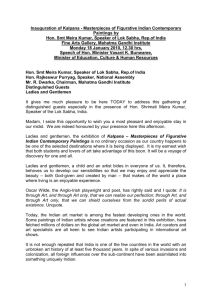History Test: Colonialism, Imperialism, and Nationalism
advertisement
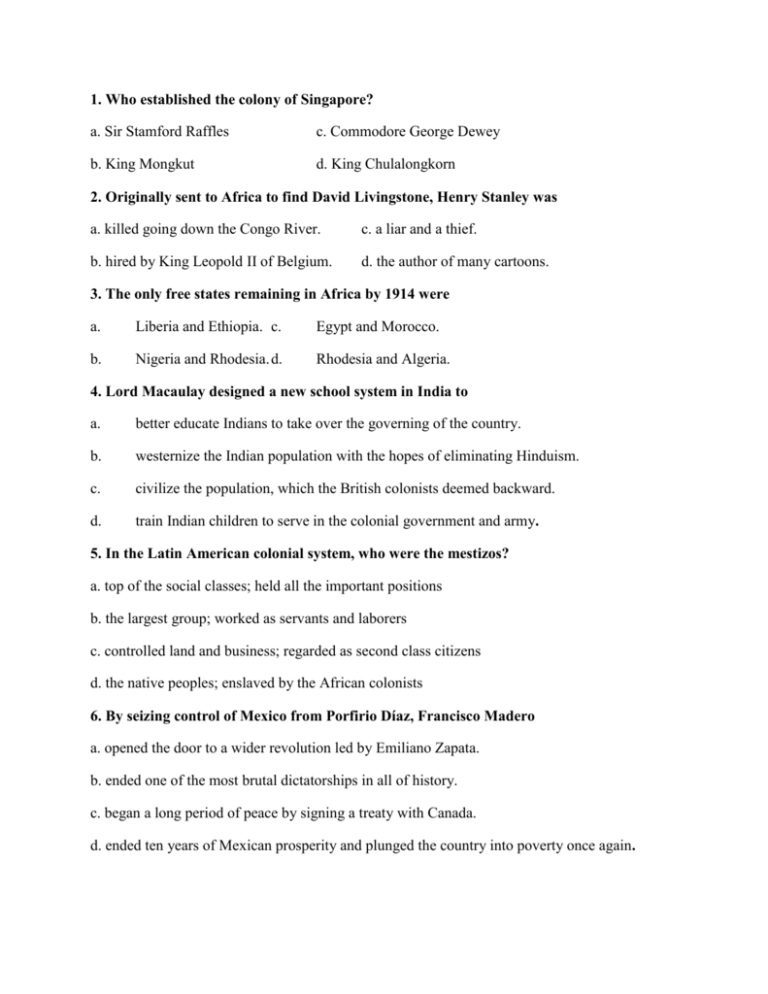
1. Who established the colony of Singapore? a. Sir Stamford Raffles c. Commodore George Dewey b. King Mongkut d. King Chulalongkorn 2. Originally sent to Africa to find David Livingstone, Henry Stanley was a. killed going down the Congo River. c. a liar and a thief. b. hired by King Leopold II of Belgium. d. the author of many cartoons. 3. The only free states remaining in Africa by 1914 were a. Liberia and Ethiopia. c. Egypt and Morocco. b. Nigeria and Rhodesia. d. Rhodesia and Algeria. 4. Lord Macaulay designed a new school system in India to a. better educate Indians to take over the governing of the country. b. westernize the Indian population with the hopes of eliminating Hinduism. c. civilize the population, which the British colonists deemed backward. d. train Indian children to serve in the colonial government and army. 5. In the Latin American colonial system, who were the mestizos? a. top of the social classes; held all the important positions b. the largest group; worked as servants and laborers c. controlled land and business; regarded as second class citizens d. the native peoples; enslaved by the African colonists 6. By seizing control of Mexico from Porfirio Díaz, Francisco Madero a. opened the door to a wider revolution led by Emiliano Zapata. b. ended one of the most brutal dictatorships in all of history. c. began a long period of peace by signing a treaty with Canada. d. ended ten years of Mexican prosperity and plunged the country into poverty once again. 7. Who seized power in Egypt in 1805 and established a separate Egyptian state? a. Muhammad Ali c. Muhammad Ahmad b. Ferdinand de Lesseps d. General Charles Gordon 8. The Boers were descendants of a. the indigenous Zulu peoples of South Africa. b. Watusi nomads, who had been driven south by German colonists. c. the original Dutch settlers of Cape Town and the surrounding areas. d. German colonists who pushed the Zulu peoples out of Nigeria. 9. In 1857, a growing Indian distrust of the British led to a. the British replacing indirect rule with divine rule. b. a treaty between Great Britain and India, restoring independence to India. c. the British establishing a fort at Kanpur. d. the First War of Independence, which the British called the Sepoy Mutiny. 10. What was the goal of the Indian National Congress? a. immediate independence for India and Pakistan b. a share in the governing process of India c. a revolution that was embraced by both Hindus and Muslims d. a new constitution and the violent overthrow of British rule 11. Who was the Indian author who was also a social reformer, spiritual leader, educator, philosopher, singer, and painter? a. Rabindranath Tagore c. Mohandas Gandhi b. Apu Nahasapeemapetilon d. Mumbai Gujarat 12. The conservative elites in Mexico chose ____ to lead a revolt against Spanish rule. a. Sancho Panza c. Agustín de Iturbide b. Miguel Hidalgo d. Simón Bolívar 13. The son of Native American peasants, Benito Juárez a. misused state funds, halted reforms, and created chaos as ruler of Mexico. b. ruled by military force and was supported by the landed elites. c. fought San Salvador and lost almost half of Mexico. d. brought liberal reforms to Mexico, including land distribution to the poor. 14. On average, how fast does a ship move through the Panama Canal? a. 8–10 miles per hour c. 5–6 miles per hour b. 8–10 km per hour 5–6 km per hour d. 15. How many miles shorter was the trip from New York City to San Francisco going through the Panama Canal than going through the Strait of Magellan? a. 7,700 c. 10,000 b. 17,500 d. None of the above 16. Which route went south of the Equator? a. the route via the Strait of Magellan c. Both A and B b. the route via the Panama Canal d. None of the above Complete civil disobedience is rebellion without the element of violence in it. An out and out civil resister simply ignores the authority of the state. He becomes an outlaw claiming to disregard every unmoral state law…. In doing all this he never uses force and never resists force when it is used against him. In fact, he invites imprisonment and other uses of force. From Mohandas Gandhi. 17. How do civil resisters handle the use of force against them? a. They rebel against it. c. They do not resist it. b. They meet force with force. d. None of the above 18. According to Gandhi, which is true of civil resisters? a. They uphold the authority of the state. b. They disregard laws that they believe are unmoral. c. They use force. d. They try to avoid imprisonment. Mr. President [William McKinley], the times call for candor. The Philippines are ours forever. And just beyond the Philippines are China’s unlimited markets. We will not retreat from either. We will not abandon an opportunity in [Asia]. We will not renounce our part in the mission of our race, trustee, under God, of the civilization of the world. From U.S. Senator Albert Beveridge of Indiana, in a speech given in the Senate, 1900. 19. What is the main idea of this passage? a. that the United States should claim China as a territory b. that the Philippines should be made a state c. that the United States should pursue economic advantages in Asia d. that the United States and China should become equal partners in trade Some time ago a party of men came to my country . . . They asked me for a place to dig for gold, and said they would give me certain things for the right to do so. I told them to bring what they could give and I would show them what I would give. A document was written and presented to me for signature. I asked what it contained, and was told that in it were my words and the words of those men. I put my hand to it. About three months afterwards I heard . . . that I had given by the document the right to all the minerals of my country. From Louis L. Snyder, ed., The Imperialism Reader, 1962. 20. What does it mean to “put [a] hand to” something, as used in the passage? a . to hit c. to sign b. to tear up d. to shake hands 21. In this passage, what did the speaker expect in return for showing the men where to dig? a. a place to dig for gold b. the rights to all the minerals in the country c. fair exchange d. None of the above What, then shall the language of education [in India] be? [Some] maintain that it should be the English. The other half strongly recommend the Arabic and Sanskrit. The whole question seems to me to be, which language is best worth knowing?… It is, I believe, no exaggeration to say that all the historical information which has been collected from all the books written in the Sanskrit language is less valuable than what may be found in short textbooks used at preparatory schools in England. From Stanley Wolpert, A New History of India, 1977. 22. What attitude is reflected by the speaker? a. that education is not important c. a sense of British superiority b. that Indians should not be educated d. Both A and B On the return journey, a European Sergeant of the Police expelled some Indian gentlemen from a railway-carriage with great insolence. Pramathanath, dressed in his European clothes, was there. He, too, was getting out, when the Sergeant said: “You needn’t move, sir. Keep your seat, please.” At first Pramathanath felt flattered at the special respect thus shown to him. When however, the train went on, the dull rays of the setting sun, at the west of the fields, now ploughed up and stripped of green, seemed in his eyes to spread a glow of shame over the whole country. From Rabindranath Tagore, We Crown Thee King, 1898. 23. Why did Pramathanath feel ashamed during this train ride? a. He realized that his country was being dominated and changed by Europeans. b. His fellow Indians did not know how to dress on balance. c. A European policeman asked him to stay in the railway car. d. None of the above My children, this day comes to us as a new dispensation. Are you ready to receive it? Will you be free? Will you make the effort to recover from the hated Spanish the lands stolen from your forefathers 300 years ago? —From Miguel Hidalgo 24. What does the speaker of this quote hope to accomplish? a. to comfort his people c. to calm his children b. to arouse anger against Spain d. None of the above 25. Which of the following best describes the life of Africans under European rule? a. Life improved through education and skill training. b. Life improved because new farming methods improved crop yields. c. Africans saw little benefit of their hard work. d. Africans were forced to move to cities to prevent them from rising up against European rule.
